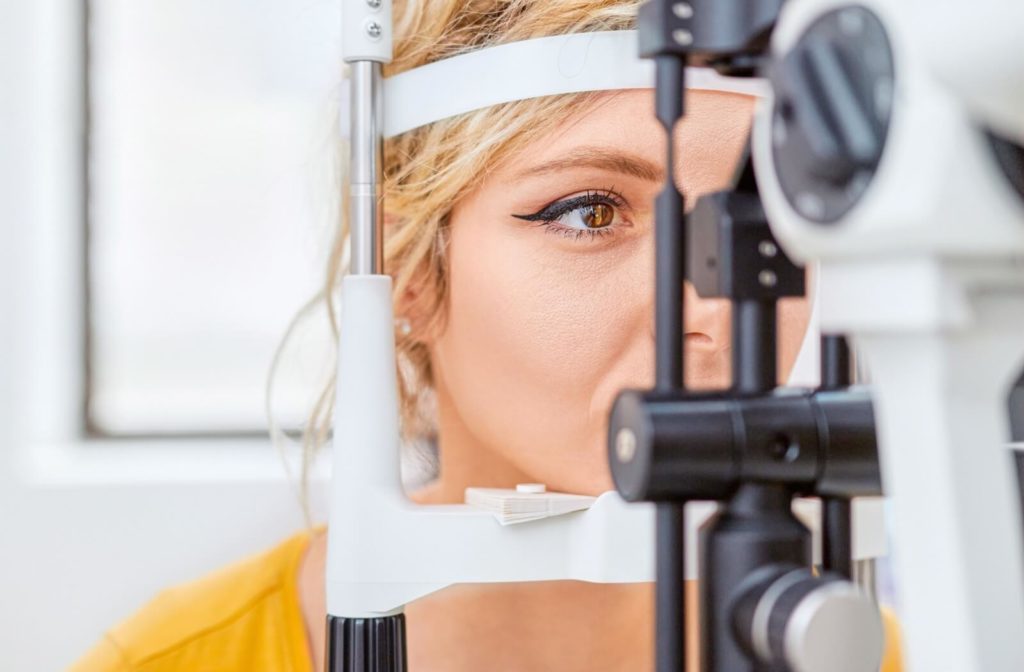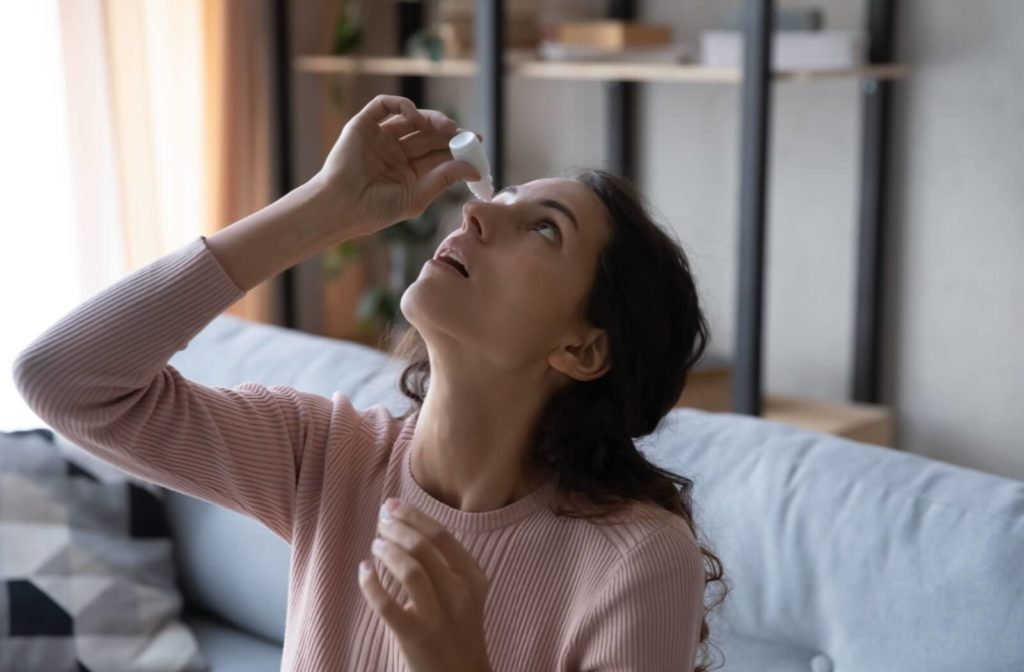Is the solution to your dry, sore eyes as clear as an eye drop, or could your reliance on that little vial cloud the vision of your true eye health?
Eye drops can be a quick fix that provides much-needed comfort or symptom relief from conditions like dry eye disease. They are a mainstay in many a purse, pocket, and bedside drawer, offering instant relief at a literal blink’s notice.
Whether you’re battling pollen season, a long day staring at screens, or simply a dry climate, it feels instinctive to reach for these little miracle workers. However, you may want to rethink this action.
Unless instructed by your eye doctor, using eye drops every day may cause harm—especially if using the wrong eye drop for the problem. In many cases, it’s better to deal with the underlying cause of your dry eyes rather than focusing on the daily use of eyedrops, if possible.
Types of Eye Drops
There are many different types of eye drops. Understanding each one can help you make better choices for your eyes.
- Lubricating (artificial tear) eye drops: These eye drops are typically the most common over-the-counter (OTC) option and are safe for daily use.
- OTC Medicated eye drops: A medicated eye drop tackles specific conditions like redness, allergies, or infections.
- Prescription eye drops: Your eye doctor must prescribe these eye drops, and they are usually for conditions that have advanced beyond simple dryness.
Eye Drops for Dry Eye
Dry eyes can be more than just a nuisance—they can significantly impact your quality of life. Fortunately, lubricating eye drops, often referred to as artificial tears, offer effective relief by supplementing your natural tear film and alleviating discomfort.
Choosing the Right Eye Drops
- Severity of dryness: For mild to moderate dryness, standard artificial tears may suffice. Severe cases might benefit from gel-based drops or ointments.
- Contact lens compatibility: If you wear contacts, we can recommend eye drops safe for use with contact lenses.
- Frequency of use: If you need to apply drops multiple times a day, preservative-free eye drops help to reduce the risk of irritation.
Benefits of Eye Drops
Eye drops can be superheroes in a tiny bottle, coming to the rescue at the first sign of dryness, redness, or irritation. Artificial tears can mimic the real thing, giving you a refreshed feeling with every drop. They’re usually pH-balanced to prevent stinging and sometimes contain electrolytes to promote healing. Other benefits of eye drops include:
- Lubricating eye drops can relieve dryness and irritation
- Artificial tears promote can comfort and surface healing
- Anti-allergic drops can alleviate the burning and stinging associated with allergies
- Medicated eye drops can reduce the chance of systemic side effects
- Glaucoma drops can reduce the risk of blindness and relieve pressure
Potential Risks of Daily Use
While there can be many benefits of eye drops, what goes in might not always come out in your favor. There’s a risk of overuse, leading to dependency on eye drops for moisture and comfort. Plus, some ingredients in medicated drops may cause more harm in the long run, especially when used without medical supervision.
Dependency on Eye Drops
If we rely on eye drops to keep our eyes moist and lubricated without dealing with the underlying issue, it can result in an increased need for them as we age and symptoms worsen. This dependency doesn’t account for something untreatable, so it’s critical to discuss this with your optometrist. They can recommend the best way to approach eye drop use.
Allergic Reactions
Manufacturers formulate eye drops and design them to be safe for the human eye. But the ingredients list on your eye drop bottle can sometimes read more like a periodic table, with preservatives and additives that not everyone’s eyes can handle.
Allergies or sensitivities to eye drop preservatives can cause redness, itching, and swelling—symptoms you’re trying to avoid by using them in the first place. If you’re sensitive to the preservatives in certain brands of eye drops, a preservative-free formula is ideal if you must use eye drops daily.
Medicated Eye Drops
Your eye doctor may prescribe medicated eye drops to fight an infection, or you might need a medicated eye drop to fight off seasonal allergies. These eye drops should be used as the manufacturer and your eye doctor recommend to avoid any complications or reactions from the medical ingredients.
Dry Eye Treatment Options Alternative to Daily Eye Drop Use
For some eye conditions, eye drops are indeed a great solution. However, they might not be the only solution—or a solution at all depending on your eye health, medical condition, or lifestyle. There are lifestyle changes and other approaches to eye health that could lessen your need for the liquid relief of eye drops every day.
Preservative-Free Eye Drops
Sometimes daily eye drop use is unavoidable. Preservative-free eye drops are probably your best bet in these cases, especially if you are allergic or sensitive to preservatives.
Prescription Eye Drops
If over-the-counter drops aren’t doing the trick, we may recommend prescription eye drops. These medications work by reducing inflammation in the tear glands, helping your eyes produce more of their own natural tears over time.
Lifestyle Changes
Simple changes in daily habits can also make a difference:
- Reducing screen time or practicing the 20-20-20 rule (looking away every 20 minutes for 20 seconds at something 20 feet away) can reduce digital eye strain, a common dry eye trigger.
- Omega-3 supplements have been shown to support healthy tear production.
- Humidifiers can help maintain moisture in dry indoor environments.
- Drinking more water can contribute to better eye health.
Scleral Contact Lenses
For severe dry eye, scleral lenses offer another solution. These custom-fit lenses create a fluid reservoir over the eye’s surface, keeping it hydrated throughout the day.
Consult with Your Eye Doctor
Your optometrist can give you an all-encompassing perspective on your ocular health by diagnosing underlying conditions and providing treatment plans that offer effective and long-term relief. In some cases, they may recommend daily eye drop use. But then they can direct you to the best brands or types.

Talk to Your Eye Doctor About Your Symptoms
Like most things in life—treats, TV, and even eye drops—it’s all about balance. If your eyes are your window to the world, they deserve care beyond a daily dose of eye drops.
Reach out to the team at Total Vision Diamond Bar or book an appointment. We’re happy to sit down with you and review your symptoms. Then we can develop an effective treatment plan for your dry eyes and get you the comfort you need in your daily life.



